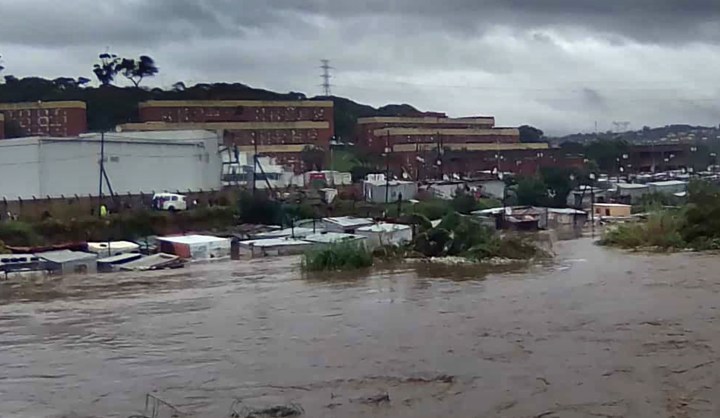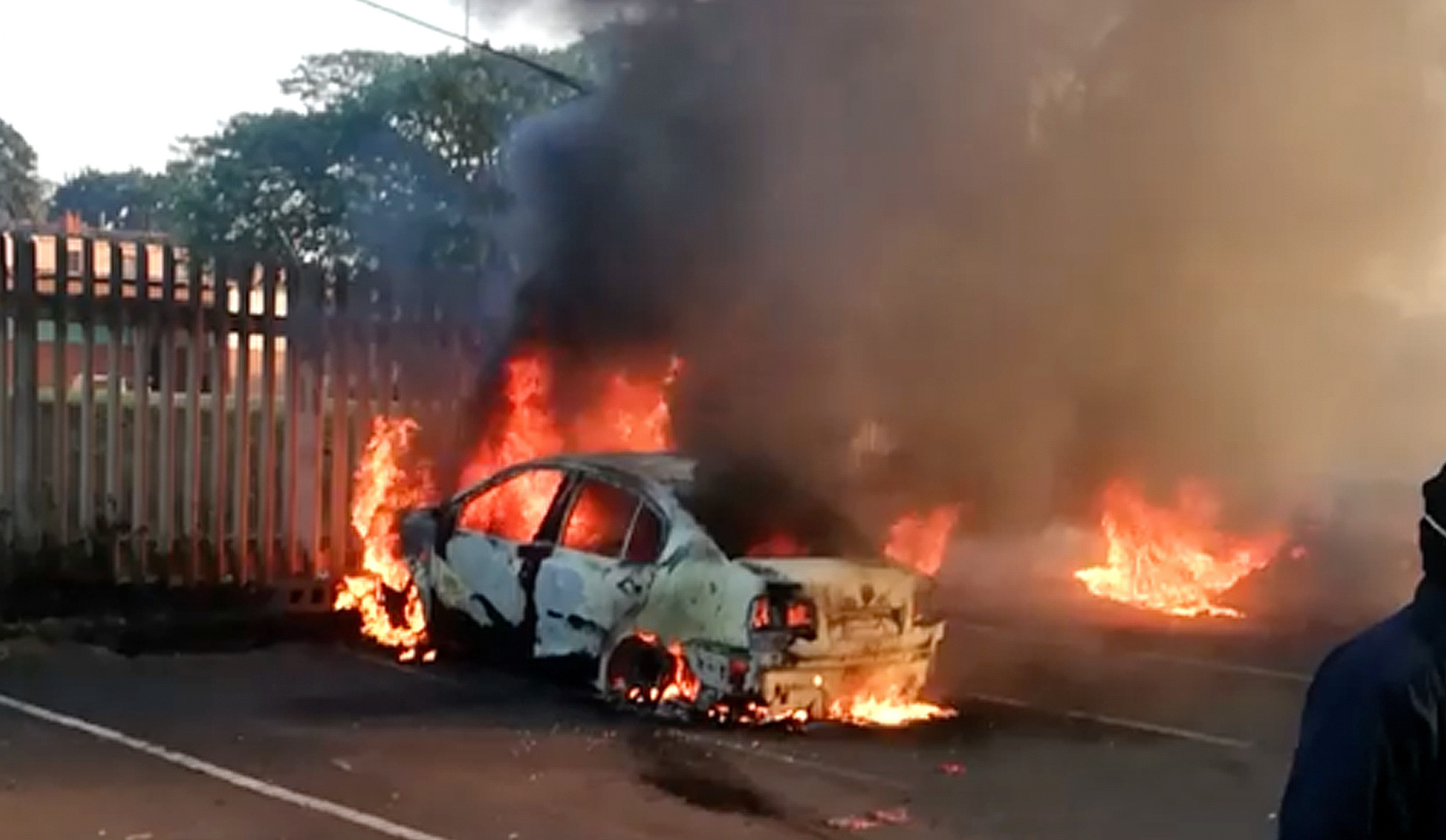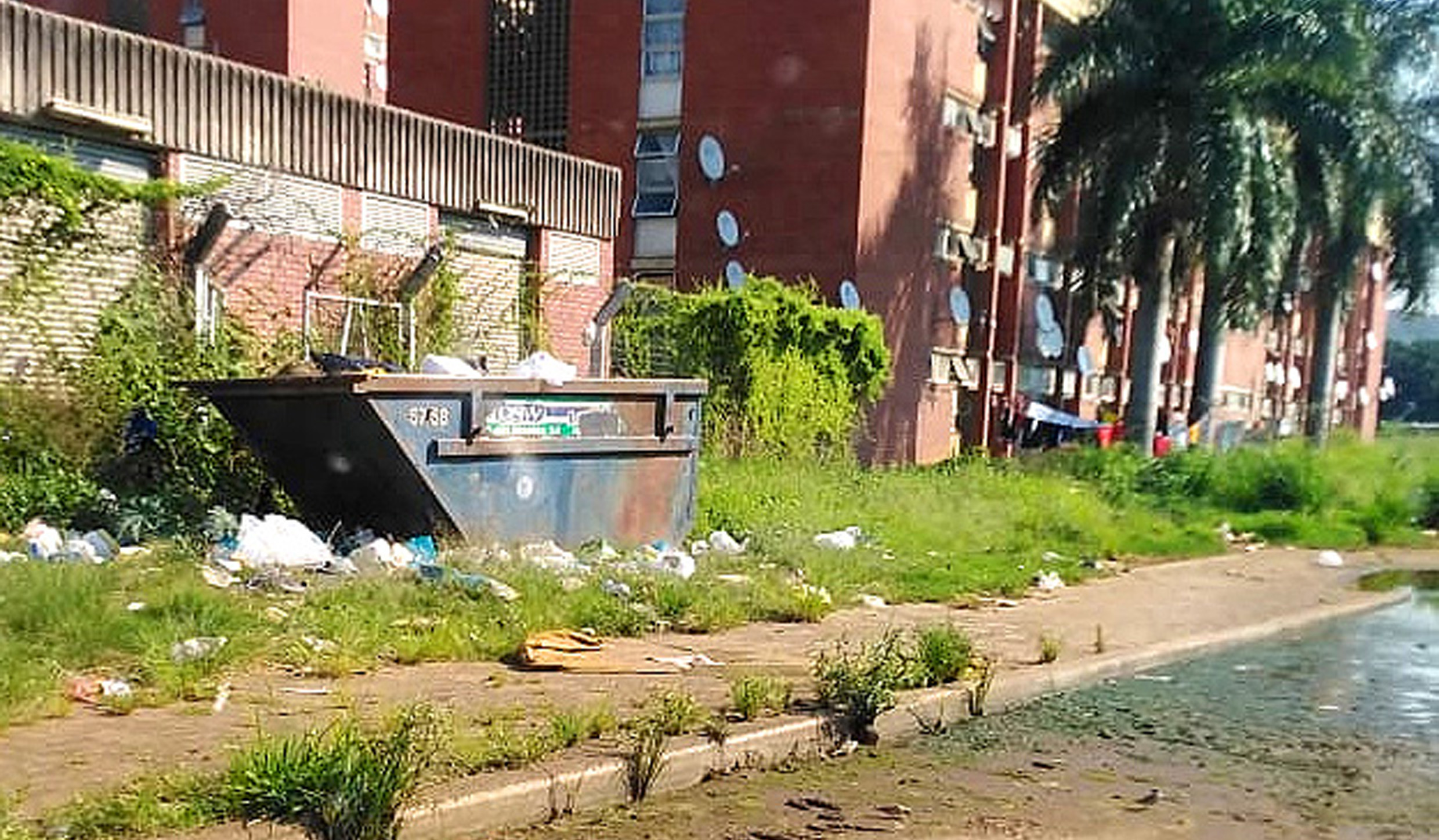OP-ED
The government risks Tehuis hostel becoming the next Glebelands (Part 1)

At the Tehuis hostel in Umlazi, Durban, existing tensions combined with what appears to be systemic corruption within Transnet’s administration now show all the signs of devolving into a crisis similar to what went down at nearby Glebelands hostel. The government is aware, the police are aware, the ANC is aware, but little is being done.
A storm is brewing at Tehuis hostel, similar to the carnage that decimated nearby Glebelands hostel, left more than 130 dead since 2014, caused widespread community displacement, dispossession and trauma, and whose hitmen contributed to the province’s rising number of political killings.
Testimonies at the Moerane Commission of Inquiry into KZN’s political killings revealed that, from as far back as 2009, the government, the police and provincial leaders were aware of conditions that led to Glebelands’ meltdown, but did nothing until it was too late. Local community leaders are now doing their best to stop a similar catastrophe from developing at Tehuis. But, as with Glebelands, it seems powerful political interests are being put before the lives of the community.

Ward 78 protests on 20, 21 and 22 July targeted government buildings and vehicles when community frustration at more than a decade of failed service delivery boiled over. (Photo supplied)
Over the past decade, KZN has seen at least 355 political killings, of which 140 occurred in eThekwini. Assassinations are already escalating ahead of the 2021 local government elections despite ANC contenders’ claims that murder will no longer be used in the race for political positions and the looting opportunities that come with public office.
Just as hostel communities were used as weapons of war by the former apartheid forces and liberation movements in the struggle against apartheid, poor communities’ desperation is increasingly channelled to serve local leaders political and economic ambitions. Violence often follows.
The Moerane Commission of Inquiry into KZN’s political killings found that politically rooted chaos at the Glebelands hostel was deliberately fostered so that crime and corruption could flourish unimpeded. Political leadership remained unresponsive to long-standing community grievances, service delivery collapsed, and the ensuing lawlessness led the hostel to become known as a “home for hitmen”.

Squalid and unhygienic conditions at Tehuis hostel, Umlazi, Durban. (Photo supplied)
eThekwini also (arguably) leads the field in corruption. The auditor-general recently slated the municipality as having the highest irregular spend – R6.7-billion – in SA over the last financial year. Furthermore, the region is Ground Zero for the ANC’s deadly factional war, this time being waged between corruption-accused former mayor Zandile Gumede and eThekwini hostel manager Thabane Nyawose.
With a rapidly shrinking public purse and looming showdown between President Cyril Ramaphosa’s “constitutionalists” and the pro-Zuma forces of “Radical Economic Transformation”, the stakes could not be higher. This factionalism tears communities apart, turning brother against brother and comrade against comrade. The poorer and more desperate the community, the deeper and more dangerous are the rifts it creates. There can be little doubt that the looming conflict at Tehuis reflects the ANC’s regional political dynamics but that does not make the community’s fears any less credible nor deserving of attention.
It is against this background and in the midst of a deadly pandemic that hostel leaders are desperately trying to halt potential bloodletting and address decades of neglect. However, as with Glebelands, it seems the state is putting political interests ahead of the lives and well-being of the community.
Historic neglect
Unlike eThekwini’s 10 other hostels, Tehuis – built during the apartheid era to house railway workers – is owned and administered by Transnet Properties. Like other government-administered hostels, post-1994 intentions to transform Tehuis into a liveable, family-friendly, low-cost housing complex with individually owned units came to naught.
In 2003 the eThekwini Municipality facilitated a public/private partnership between Transnet and ProProp for the development of the R150-million Mega City shopping complex. This development was meant to reverse some of the inequities wrought by the apartheid era’s spatial planning, which had located poor black communities on the periphery of urban development, far from amenities. Because part of the land on which Mega City was to be built previously formed part of Tehuis hostel (a sports field, canteen and kitchen), to compensate for the loss of space and facilities, the development was envisaged to have compensated the community by way of employment, business ownership opportunities, rental income and hostel redevelopment.
However, while construction of Mega City steamed ahead, within two years, delayed funding stalled the hostel’s redevelopment and residents’ living conditions deteriorated. Now without recreational facilities and with little open space, the loss of communal kitchen facilities forced residents to prepare their food in shared-sex, dilapidated and often filthy, ablutions. For example, while a resident drains a pot of rice into a bathroom sink, someone may be using the toilet less than a metre away – a situation made worse by a lack of toilet and shower doors. These conditions remain to date.
And while the hostel decayed, the worsening economic climate and rising unemployment put individual home ownership beyond the reach of most residents. Instead of improving all township residents’ lives, the Mega City development came at the expense of the Tehuis community. The bitterness lingers.
At some stage around 2014 it seems there were moves to put the hostel under the administration of the eThekwini Municipality – a development that residents broadly welcomed. However, this too failed to happen although an executive council report suggests there was an agreement that rentals and service provider contracts would remain in place until the matter was resolved.
Degraded living conditions and a lack of maintenance and repairs now present a risk to residents’ safety and health. Persistent lack of consensus and information, poor stakeholder communications and lack of proper community engagement have led to considerable tensions in the community and uncertainty regarding their future – all of which was predicted in a UKZN 2006 research paper. Subsequent divisions in the community – seemingly orchestrated by the ward councillor – later contributed to the instability.
Political arrogance
Tehuis houses around 6,000 mostly ANC supporters and falls within eThekwini’s ward 74. In 2006, ANC member Nolubabalo Mthembu was elected ward councillor. Some community leaders claim Mthembu enjoys the political support of Police Minister Bheki Cele and had been close to KZN strongman and former ANC regional chairperson, the late John Mchunu, who was widely credited with establishing the ANC’s toxic patronage system.
Cele – who grew up in Lamontville, where, incidentally, his father worked for the then-South African Railways – together with Mchunu, were instrumental in orchestrating the replacement of former president Thabo Mbeki with Jacob Zuma. As with many community conflicts playing out today, Tehuis residents’ problems – although simmering for a number of years – grew legs around the time of Zuma’s election when the party’s interests became almost solely focused on internal factional warfare.
Mthembu, an alleged opponent of former Durban mayor Zandile Gumede, is also a controversial and some say, divisive and dangerous political player. In politics there are depressingly few “good guys” and the enemy of one’s enemy is rarely one’s true friend.
As far back as 2009, communities living in Lamontville (which falls within ward 74) demanded Mthembu and Mchunu’s resignation, claiming they gave RDP houses only to their allies while those who had been waiting years for housing were sidelined. Local leaders reported at the time that Mthembu and her supporters disrupted a community meeting and ordered the shooting of a resident. Mthembu later denied this.
Since 2013, shack dwellers’ movement Abahlali baseMjondolo (AbM) reported the regular intimidation, persecution and illegal eviction of their members and residents belonging to opposition parties, allegedly on the orders of Mthembu and her supporters within the ANC and the municipality. They claimed court orders preventing shack demolitions at Sisonke (formerly Madlala) Village – a nearby informal settlement – were routinely ignored and their meetings and protests often disrupted by thugs who shouted they should “go back to the Eastern Cape” if they wanted to protest – echoes of similar ethnic discrimination which would be heard later at Tehuis.
In 2016 the Tehuis community resolved to boycott the municipal elections because of long-standing service delivery failure and intra-ANC strife. However, they said that shortly before the poll a number of residents were offered municipal cleaning jobs while eThekwini workers were sent to spruce up the hostel, despite Transnet – not the municipality – being responsible for servicing the property. They said it appeared votes had been traded for jobs and the municipality was an accomplice. They also alleged Cele helped secure Mthembu’s reinstatement for a third term as ward 74 councillor despite opposition from the majority of her constituents and in violation of the ANC’s constitution which only allows for two terms in office.
It was the 2016 local government elections that saw Gumede donning the city’s mayoral chain after eventually winning the ANC’s much-postponed and highly contested regional elective conference. Cele had long since fallen out with Zuma, effectively pitting him and alleged allies such as Mthembu, against Gumede’s pro-Zuma, Radical Economic Transformation crowd. As Tehuis’s former chairman and many of its block leaders were Gumede’s supporters, the political dynamics at that time likely exacerbated existing tensions between the community and their councillor.
In 2017 three people, including an AbM youth leader and local ANC strongman, were killed during a community meeting at Sisonke. In a press statement after the murders, AbM reported they had been informed that “local ANC structures” were threatening to kill and drive AbM members from the area.
Parts of KZN were declared disaster zones after catastrophic floods in April 2019 left almost 90 people dead, more than 1,400 homeless and incurred R3.5-billion infrastructure damage. Umlazi was one of the worst affected areas, where 14 people were killed and hundreds of RDP homes and shacks were washed away.
A few days after the flood, residents of informal settlements in Umlazi and other affected areas blocked roads across Durban, demanding to know why the municipality had not addressed major infrastructure problems that had led to similar devastation during floods in October 2017. Although corruption-accused former mayor Zandile Gumede denied ageing infrastructure was to blame for the damage, shortly thereafter the municipality committed R658-million for emergency infrastructure repairs and assistance for flood-ravaged families. Finance Minister Tito Mboweni also announced that the National Treasury would provide R151.2-million for KZN’s flood victims, while the Chinese government stepped up with over R1-million worth of goods, and various charities and celebrities also contributed relief for stricken Umlazi families.
At Mega Village, an informal settlement on the banks of the Mlazi Canal directly behind the Mega City shopping mall, a number of residents who had been left homeless and destitute were accommodated in temporary tented accommodation in Tehuis hostel grounds.
During a media briefing on 29 April, former KZN premier Willies Mchunu declared that the Department of Human Settlements had been approached to prioritise accommodating homeless flood victims.
Only a few weeks later, on the night before the May 2019 general elections, Lamontville and Umlazi residents again blockaded roads and burned tyres. Bheki Cele, who cast his vote in Lamontville, later claimed all was peaceful after he “briefed provincial [SAPS] management about the situation in Umlazi”.
No justice, no peace
In an interview with East Coast Radio in June that year, the MEC for the KZN Department of Social Development, Nonhlanhla Khoza, announced the department would continue to support flood victims and that “on top of” having provided them with food parcels, Sassa “had also given each family R15,000 and R3,500 at some point to keep families going”. Khoza also reported that, “the National Department of Social Development offered them R20,000 per [family] member who died”.
Additionally, the Department of Cooperative Governance announced R90-million had been “made available to the eThekwini municipality to rebuild properties and relocate displaced families”.
In his State of the Province Address on 28 June 2019, KZN Premier Sihle Zikalala confirmed that the National Department of Human Settlements “had already released funds for housing rehabilitation in eThekwini” and that negotiations were underway “to secure sites for transitional housing for those who needed to be relocated”.
However, more than a year later, many displaced Mega Village residents are still living in the tent at Tehuis, an arrangement that has become mired in corruption allegations. Hostel leaders claim that, for unknown reasons, the municipality pays monthly rental for the tent to the councillor instead of directly to the supplier. They allege that these apparently vastly inflated rental payments are not always passed on to the supplier, with the result that the supplier threatened to collect his tent, which would have left the remaining flood victims without shelter. They also allege that disaster management officials, Mthembu, assorted ward and hostel committee members are all profiting from the continued hire of this tent.
Hostel leaders also allege that disaster relief funds meant for the ongoing monthly purchase of food parcels for the tent dwellers are given to a member of Mthembu’s ward committee, who, instead of purchasing the required amount of food, pockets some of the money, leaving the flood victims with meagre sustenance.
More recently, Mega Village residents and former hostel committee members have begun asking about a R3-million disaster relief fund they claim was provided to rehouse the tent dwellers. They want to know how much longer the flood victims will be forced to live in the tents and why they have not received the same support as other victims. According to the eThekwini municipality website, 48 flood victims from ward 78 were handed keys to double-storey corrugated iron homes only two months after their homes were swept away.
None of this could be confirmed, however, as the city’s procurement and financial records are shrouded in such secrecy that even the former public protector found it almost impossible to penetrate. It is also futile asking city officials for clarity as the truth is anathema to most government functionaries, or they simply don’t respond. The police have thus been asked to investigate all the community’s allegations.
The chaos continues
Almost a year to the day since the 2019 floods, the distribution of coronavirus lockdown food parcels in late April caused demonstrations and looting when starving Lamontville transit camp residents claimed Mthembu had excluded them from critically needed social support. When the community demanded she address them, Mthembu reportedly told a resident: “I’m not coming to that nonsense.”
A local Sassa official later reportedly confirmed to the community that, “the journey to the food parcels begins with the ward councillor”. Metro police dispersed the hungry protesters and reportedly reprimanded them for contravening lockdown regulations.
Tehuis leaders also reported similar food parcel irregularities with Mthembu’s allies, one of whom, they claimed, was seen loading food parcels into his vehicle to take to friends and family members on the south coast.
Given the history, it should come as no surprise, when, in the early hours of 20 July, community rage at decades of neglect, lack of electricity and water, proper housing and corruption, boiled over and led to the incineration of the local Sassa office, a clinic and six Sassa and metro police vehicles. While the municipality condemned the protests as “treason”, some media reports highlighted the long-standing problems with unresponsive local governance.
Community leader Phumlani Mxhokozo told TimesLIVE, “We are striking for electricity and water. We don’t want izinyoka nyoka [illegal connections] because our children are dying. We also want proper house numbers [official addresses] for our shacks.”
Mxhokozo claimed, “[Mthembu] doesn’t come to us, she doesn’t engage with us or find out what we need. We don’t even know what she looks like.”
Tehuis leaders confirmed the community’s grievances. They said, amongst other issues, Mthembu had long promised the community electricity, but after waiting for years they had eventually resorted to illegal connections. These had recently been disconnected during the coronavirus pandemic and at the height of one of the city’s coldest winters.
While Mthembu can obviously not be blamed for all the shortcomings in her ward, it would appear she and her allies in the ANC and eThekwini municipality have done little to respond to community needs or encourage their engagement and participation in local development; and much to sow division, conflict, marginalisation and violence.
At Tehuis, the existing tensions combined with what appears to be systemic corruption within Transnet’s administration now show all the signs of devolving into a crisis similar to what went down at Glebelands. The government is aware, the police are aware, the ANC is aware, but little is being done.
Part 2 will unpack some of the issues at Tehuis and measures the community has already taken to prevent what threatens to become another flow of blood that could devastate desperate local communities and further destabilise an already volatile region. DM















 Become an Insider
Become an Insider